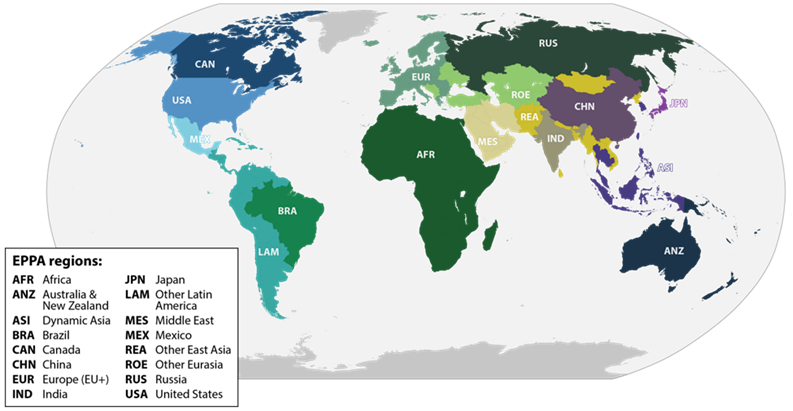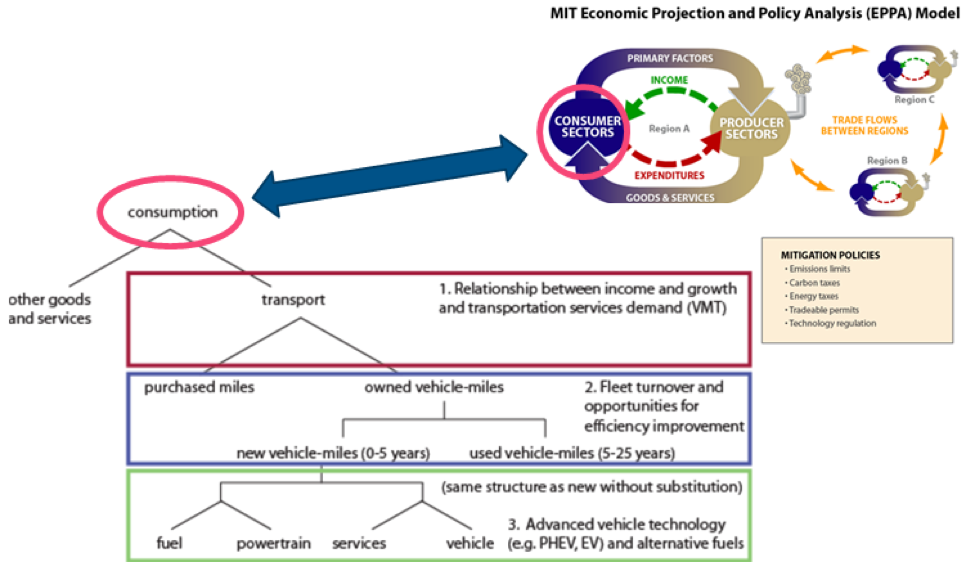
As detailed in a new MIT News article, the MIT Energy initiative’s (MITEI) “Mobility of the Future” study aims to determine how developments in technology, fuel, infrastructure, policy and consumer preference will impact the transportation sector.
To support that study, MIT Joint Program on the Science and Policy of Global Change researchers will apply their expertise in global economic and policy modeling. Their main task is to enhance the MIT Economic Projection and Policy Analysis (EPPA) model to assess how the vehicle fleet and fuel mix will evolve in response to various transportation, energy and climate policy scenarios, and the likely costs of different policy options.
For more information, see the “GLOBAL ECONOMIC AND POLICY MODELING” section of MITEI’s Mobility of the Future website, which is reproduced here:
Global Economic and Policy Modeling
The team for the Global Economic and Policy Modeling task is led by Sergey Paltsev, senior research scientist at the MIT Energy Initiative and deputy director of the MIT Joint Program on the Science and Policy of Global Change. The team (which includes Joint Program researchers Henry Chen, Abbas Ghandi, and Paul Kishimoto) has an extensive experience in analyzing diverse aspects of the future mobility pathways, including impacts of fuel economy standards, low-carbon options for transport and electricity, hydrogen fuel cell cars, natural gas vehicles, and hybrid cars, which are published in the leading peer-reviewed journals like Journal of Transport Economics and Policy, Climate Policy, Transportation, Energy Economics, Transportation Research Part A, Economic Modeling, and others. The team’s work on the U.S. fuel economy standards was recognized with the 2012 Pyke Johnson Award from the Transportation Research Board.
For the Mobility of the Future study, the team will enhance the MIT Economic Projection and Policy Analysis (EPPA) model to investigate the interactions between different transportation technologies (e.g., ICE, PHEV, BEV), fuel prices, transportation policies, energy policies, and climate policies in an economy-wide setting at a global level (disaggregated by 18 regions).

Figure 1. Regions of the EPPA model
The analysis will assess implications for GHG emissions, air pollutants, fuel consumption, fleet composition, economic growth, and macroeconomic cost of avoided CO2 emissions. The main target questions for the team are: What are the impacts of energy, transportation, and climate policies on energy demand, on the economy, on the environment including global climate change? How will the vehicle fleet and fuel mix evolve in response to various policy scenarios? What are the macroeconomic costs of different policy options?
The EPPA model is a dynamic multi-sector, multi-region, computable general equilibrium (CGE) model of the world economy with detailed representation of energy technologies, GHG emissions, air pollutants, and land use change, and transportation. For this study, the EPPA model will be updated for the latest projections of costs of electric, plug-in hybrid and fuel cell vehicles, fuel standards, fleet dynamics, regional vehicle demand dynamics, and economic development. Additional information about the EPPA model is available here.

Figure 2. Schematic overview of the household transportation details and the circular flow of goods and resources in the EPPA model
Photo: A major study — “Mobility of the Future” — will explore how consumers and markets will respond to potentially disruptive technologies, business models, and government policies. The scope of the study is ground transportation, with an emphasis on the movement of people. (Photo: iStock)

